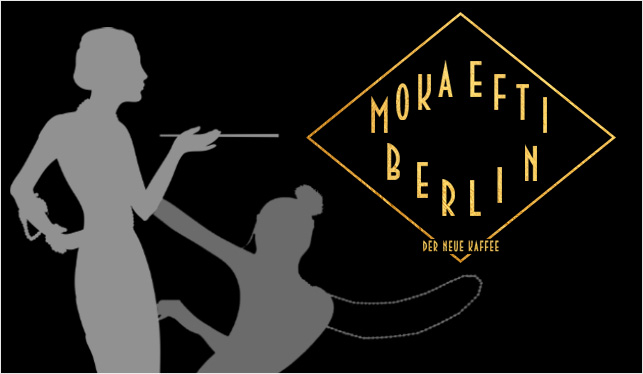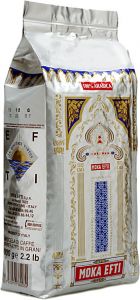
- Blend ratio: 100% Arabica
- Aroma(s) : Nutty, Fruity
- Type / Nature: Whole beans
- Coffee maker / Machine : Espresso machine (portafilter), Automatic machine
- Caffeine content: Low caffeine
- Package size: 1kg
- Region / Country: Northern Italy
- Degree of Roast: Medium
- Intensity: Mild
5-7 Workdays Article No. 10102
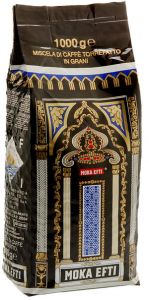
- Blend ratio: 80% Arabica / 20% Robusta
- Aroma(s) : Chocolaty, Nutty
- Type / Nature: Whole beans
- Coffee maker / Machine : Espresso machine (portafilter), Automatic machine
- Caffeine content: Medium Caffeine Content
- Package size: 1kg
- Region / Country: Northern Italy
- Degree of Roast: Medium
- Intensity: Strong
5-7 Workdays Article No. 10103
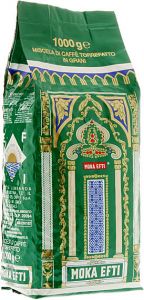
- Blend ratio: 70% Arabica / 30% Robusta
- Aroma(s) : Nutty, Malty
- Type / Nature: Whole beans
- Coffee maker / Machine : Espresso machine (portafilter), Automatic machine
- Caffeine content: Medium Caffeine Content
- Package size: 1kg
- Region / Country: Northern Italy
- Degree of Roast: Dark
- Intensity: Strong
5-7 Workdays Article No. 10104
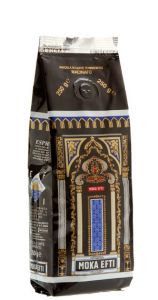
- Blend ratio: 80% Arabica / 20% Robusta
- Aroma(s) : Chocolaty, Nutty
- Type / Nature: Whole beans
- Coffee maker / Machine : Espresso machine (portafilter), Automatic machine
- Caffeine content: Medium Caffeine Content
- Package size: 250g
- Region / Country: Northern Italy
- Degree of Roast: Medium
- Intensity: Strong
5-7 Workdays Article No. 10105

- Blend ratio: 80% Arabica / 20% Robusta
- Aroma(s) : Chocolaty, Fruity
- Type / Nature: Whole beans
- Coffee maker / Machine : Espresso machine (portafilter), Automatic machine
- Caffeine content: Low caffeine
- Package size: 250g
- Region / Country: Northern Italy
- Degree of Roast: Light
- Intensity: Balanced
5-7 Workdays Article No. 10107

- Blend ratio: 80% Arabica / 20% Robusta
- Aroma(s) : Chocolaty, Fruity
- Type / Nature: Ground
- Coffee maker / Machine : Moka Pot
- Caffeine content: Low caffeine
- Package size: 250g
- Region / Country: Northern Italy
- Degree of Roast: Light
- Intensity: Balanced
5-7 Workdays Article No. 10108

- Quantity of pods/capsules : 100
- Blend ratio: 100% Arabica
- Aroma(s) : Nutty
- Type / Nature: Pods
- Coffee maker / Machine : Pods Machine
- Caffeine content: Low caffeine
- Region / Country: Northern Italy
- Degree of Roast: Light
- Low acidity: Yes
- Intensity: Mild
5-7 Workdays Article No. 10110

- Quantity of pods/capsules : 20
- Blend ratio: 100% Arabica
- Aroma(s) : Nutty, Floral
- Type / Nature: Pods
- Coffee maker / Machine : Pods Machine
- Caffeine content: Low caffeine
- Region / Country: Northern Italy
- Degree of Roast: Light
- Low acidity: Yes
- Intensity: Mild
5-7 Workdays Article No. 10114

- Quantity of pods/capsules : 100
- Blend ratio: 100% Arabica
- Aroma(s) : Nutty
- Type / Nature: Pods
- Coffee maker / Machine : Pods Machine
- Caffeine content: Low caffeine
- Region / Country: Northern Italy
- Degree of Roast: Light
- Low acidity: Yes
- Intensity: Mild
5-7 Workdays Article No. 10109

- Quantity of pods/capsules : 20
- Blend ratio: 100% Arabica
- Aroma(s) : Nutty, Floral
- Type / Nature: Pods
- Coffee maker / Machine : Pods Machine
- Caffeine content: Low caffeine
- Region / Country: Northern Italy
- Degree of Roast: Light
- Low acidity: Yes
- Intensity: Mild
5-7 Workdays Article No. 10113

- Quantity of pods/capsules : 100
- Blend ratio: 80% Arabica / 20% Robusta
- Aroma(s) : Chocolaty, Fruity
- Type / Nature: Pods
- Coffee maker / Machine : Pods Machine
- Caffeine content: Medium Caffeine Content
- Region / Country: Northern Italy
- Degree of Roast: Medium
- Intensity: Balanced
5-7 Workdays Article No. 10111

- Quantity of pods/capsules : 20
- Blend ratio: 80% Arabica / 20% Robusta
- Aroma(s) : Chocolaty, Fruity
- Type / Nature: Pods
- Coffee maker / Machine : Pods Machine
- Caffeine content: Medium Caffeine Content
- Region / Country: Northern Italy
- Degree of Roast: Light
- Intensity: Mild
5-7 Workdays Article No. 10115

- Quantity of pods/capsules : 100
- Blend ratio: 80% Arabica / 20% Robusta
- Aroma(s) : Chocolaty, Fruity
- Type / Nature: Pods
- Coffee maker / Machine : Pods Machine
- Caffeine content: Medium Caffeine Content
- Region / Country: Northern Italy
- Degree of Roast: Medium
- Intensity: Balanced
5-7 Workdays Article No. 10112

- Quantity of pods/capsules : 20
- Blend ratio: 80% Arabica / 20% Robusta
- Aroma(s) : Chocolaty, Fruity
- Type / Nature: Pods
- Coffee maker / Machine : Pods Machine
- Caffeine content: Medium Caffeine Content
- Region / Country: Northern Italy
- Degree of Roast: Light
- Intensity: Mild
5-7 Workdays Article No. 10116

- Blend ratio: 70% Arabica / 30% Robusta
- Aroma(s) : Malty, Floral
- Type / Nature: Whole beans
- Coffee maker / Machine : Espresso machine (portafilter), Automatic machine
- Caffeine content: Caffeine-free
- Package size: 250g
- Region / Country: Northern Italy
- Degree of Roast: Light
- Intensity: Balanced
- Decaffeination processes: Solvent decaffeination
5-7 Workdays Article No. 10128

- Blend ratio: 70% Arabica / 30% Robusta
- Aroma(s) : Malty, Floral
- Type / Nature: Ground
- Coffee maker / Machine : Moka Pot
- Caffeine content: Caffeine-free
- Package size: 250g
- Region / Country: Northern Italy
- Degree of Roast: Light
- Intensity: Balanced
- Decaffeination processes: Solvent decaffeination
5-7 Workdays Article No. 10129

- Quantity of pods/capsules : 100
- Blend ratio: 50% Arabica / 50% Robusta
- Aroma(s) : Chocolaty, Nutty, Fruity
- Type / Nature: Pods
- Coffee maker / Machine : Pods Machine
- Caffeine content: Medium Caffeine Content
- Degree of Roast: Dark
- Low acidity: Yes
- Intensity: Strong
5-7 Workdays Article No. 10146

- Quantity of pods/capsules : 100
- Blend ratio: 70% Arabica / 30% Robusta
- Aroma(s) : Chocolaty, Nutty
- Type / Nature: Pods
- Coffee maker / Machine : Pods Machine
- Caffeine content: Caffeine-free
- Region / Country: Northern Italy
- Degree of Roast: Medium
- Intensity: Balanced
- Decaffeination processes: Solvent decaffeination
5-7 Workdays Article No. 10147

- Quantity of pods/capsules : 30
- Blend ratio: 100% Arabica
- Aroma(s) : Nutty, Floral
- Type / Nature: Pods
- Coffee maker / Machine : Pods Machine
- Caffeine content: Low caffeine
- Region / Country: Northern Italy
- Degree of Roast: Light
- Low acidity: Yes
- Intensity: Mild
5-7 Workdays Article No. 10982

- Quantity of pods/capsules : 30
- Blend ratio: 80% Arabica / 20% Robusta
- Aroma(s) : Chocolaty, Fruity
- Type / Nature: Pods
- Coffee maker / Machine : Pods Machine
- Caffeine content: Medium Caffeine Content
- Region / Country: Northern Italy
- Degree of Roast: Light
- Intensity: Mild
5-7 Workdays Article No. 10984

- Quantity of pods/capsules : 30
- Blend ratio: 80% Arabica / 20% Robusta
- Aroma(s) : Chocolaty, Fruity
- Type / Nature: Pods
- Coffee maker / Machine : Pods Machine
- Caffeine content: Medium Caffeine Content
- Region / Country: Northern Italy
5-7 Workdays Article No. 10983

Unavailable Article No. 2761

Unavailable Article No. 2762

Unavailable Article No. 2763

- Blend ratio: 70% Arabica / 30% Robusta
- Aroma(s) : Chocolaty, Nutty
- Coffee maker / Machine : Espresso machine (portafilter), Automatic machine
- Caffeine content: Caffeine-free
- Package size: 500g
- Region / Country: Northern Italy
- Degree of Roast: Medium
- Intensity: Balanced
- Decaffeination processes: Solvent decaffeination
Unavailable Article No. 10079

- Quantity of pods/capsules : 30
- Blend ratio: 100% Arabica
- Aroma(s) : Nutty, Floral
- Type / Nature: Pods
- Coffee maker / Machine : Pods Machine
- Caffeine content: Low caffeine
- Region / Country: Northern Italy
- Degree of Roast: Light
- Low acidity: Yes
- Intensity: Mild
Unavailable Article No. 10981
Moka Efti Berlin 1926

 Giovanni Eftimiades comes from Constantinople to Berlin and opens his first small caffe with his own roastery. The Greek with an Italian passport christens his establishment and his coffee blend MOKA after the Italian model and simply adds the first 4 letters of his last name. The legendary Moka Efti coffee is born.
Giovanni Eftimiades comes from Constantinople to Berlin and opens his first small caffe with his own roastery. The Greek with an Italian passport christens his establishment and his coffee blend MOKA after the Italian model and simply adds the first 4 letters of his last name. The legendary Moka Efti coffee is born.
Soon after, Mr. Efti acquires the Equitable Palace on the corner of Leipziger and Friedrichstrasse and transforms it into the city's most popular and largest coffee house. Guests enjoy themselves on 2,800 m². In addition to a cafe and dance hall, there is a noble fish restaurant, a hairdressing salon, billiard room, chess room and even a stenography service. Great attraction of the time was an escalator for better access to the upper floors. Many guests come explicitly for that.
The interior of the salons varies from sophisticated art deco elements to oriental influences in the Arabic and Egyptian salons. The packaging of the coffees is to date a testimony of this era.
Moka Efti in oblique

On the best days, an incredible 25,000 cups of coffee were served. 4 dance bands provided a boisterous atmosphere until the early morning. Berlin is the hotspot of Europe these days. But the dark times cast their shadows ahead. The world economic crisis also brings the Moka Efti into difficulties. In 1933, Giovanni Eftimiades sells his establishment. In 1934 the rooms are already used by the NSDAP for propaganda events. Swing dancing banned from then on. The 2nd World War completely destroys the building.
Eftimiades had already sold his coffee brand in 1930 to an Italian roastery in Milan, which roasts this wonderful espresso to this day and continues the tradition.
We tracked down the roastery and are virtually bringing this espresso with a multicultural resume back home.
 Eyewitness: Mrs. Irmgard Duhre (mother of the CEO of Espresso International) was born in Berlin in 1927 and still remembers her parents buying 250g of MOKA EFTI for their Sunday coffee.
Eyewitness: Mrs. Irmgard Duhre (mother of the CEO of Espresso International) was born in Berlin in 1927 and still remembers her parents buying 250g of MOKA EFTI for their Sunday coffee.
At that time, coffee was an expensive luxury good compared to today and was celebrated accordingly. It's nice that the tradition of small roasteries in the cities is experiencing such a Rennaicance again. See Elbgold or Speichertadt coffee from Hamburg.
"Freshly roasted every day, hand-picked - fresh cake every hour". That still reads really well today and makes you want a freshly brewed coffee. Even if today we prefer milk foam instead of cream, don't we?
Even at the age of 91, Mrs. Duhre does not want to give up her daily coffee pleasure. Possibly a reason for her refreshing, still lively participation in all the happenings of this complex world.
Perhaps more than any other coffee, the history of Moka Efti illustrates the difficulties of guiding a brand through the turmoil of the last century.
Moka Efti comes to Italy
 The story of Moka Efti soon becomes the story of the Monti family of Milan. In 1930, Angelo Monti bought the Moka Efti brand with courage and entrepreneurial spirit. In the mid-1930s, Moka Efti became the official coffee supplier to the Italian royal family under King Vittorio Emanuele III.
The story of Moka Efti soon becomes the story of the Monti family of Milan. In 1930, Angelo Monti bought the Moka Efti brand with courage and entrepreneurial spirit. In the mid-1930s, Moka Efti became the official coffee supplier to the Italian royal family under King Vittorio Emanuele III.
In 1957, son Giorgio Monti took over the company's fortunes and made Moka Efti famous throughout the country.

In the mid-nineties, Giorgio's daughters Nicoletta and Mariangela joined the management. Moka Efti faced the future in 2000 and completely renewed the roasting plant.
In 2005, Moka Efti bought its first machine for the production of coffee pods, in order to meet the demands of the market. The purchase of another one followed shortly after.
Moka Efti, with its long tradition, relies on the experience of a family dedicated to constant research for continuous perfection. The consequence is an outstanding quality, which is made for people with high demands. (Recommended by FEINSCHMECKER Magazin 4/20)

 "To ashes - to dust" - The award-winning series Babylon Berlin lets the golden 20s shine again in full splendour. The centre of all events is the coffee house "MOKA EFTI", which actually existed. But what does this rather curious name actually mean? And what does Italian espresso coffee have to do with it? Berlin 1926. Giovanni Eftimiades comes from Constantinople to Berlin and opens his first small coffee shop with its own roasting plant.
"To ashes - to dust" - The award-winning series Babylon Berlin lets the golden 20s shine again in full splendour. The centre of all events is the coffee house "MOKA EFTI", which actually existed. But what does this rather curious name actually mean? And what does Italian espresso coffee have to do with it? Berlin 1926. Giovanni Eftimiades comes from Constantinople to Berlin and opens his first small coffee shop with its own roasting plant. 